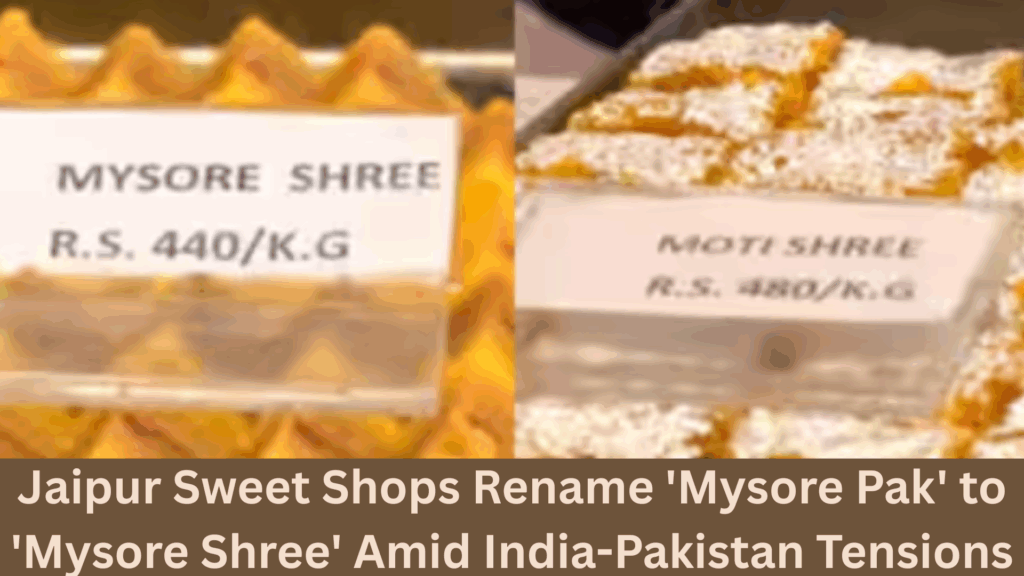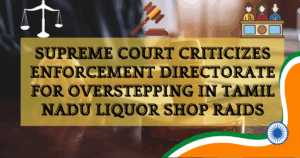In a bizarre yet patriotic movie, Jaipur Sweet Shops Rename ‘Mysore Pak’ to ‘Mysore Shree’ Amid India-Pakistan Tensions; read and know more.
Jaipur Sweet Shops Rename ‘Mysore Pak’ to ‘Mysore Shree’ Amid India-Pakistan Tensions
After India’s military response to the Pahalgam terror assault under “Operation Sindoor.” In a patriotic move, a number of confectioneries in Jaipur, Rajasthan, have renamed their well-known candies “Shree” instead of “Pak.”
As a result, if you visit a Jaipur candy store, you are likely to acquire Mysore Shree instead of Mysore Pak and Moti Pak instead of Moti Shree. As a result, popular candies that formerly had the suffix “Pak” have been renamed with “Shree” or “Bharat,” which reflects a rise in patriotism and unity. Days prior, a group of men in Hyderabad vandalized the Karachi Bakery and yelled “anti-Pakistan” chants in front of the establishment.
Reason for Renaming ‘Mysore Pak’ to ‘Mysore Shree’
Shopkeepers in Jaipur have reported that the use of the word “Pak” in the titles of popular candies was making customers uncomfortable because it sounded too much like “Pakistan.” This act of patriotism is not unique to Tyohaar Sweets; other well-known companies have also removed “Pak” from their endearing names, such as the long-standing Bombay Misthan Bhandar and Agarwal Caterers.

The renaming appears to be a reaction to tensions between India and Pakistan, particularly following the terror attack in Pahalgam on April 22 and India’s military response under “Operation Sindoor.”
More Information: Get Here
Mohit Jain, a confectioner near Jaipur Municipal Corporation, claimed that when the word “Pak” was mentioned, customers became more apprehensive. Its association with Pakistan was even ridiculed by some. We changed the candies’ name to reflect a more “patriotic” flavor. The owner of Tyohaar Sweets, Anjali Jain, shared this viewpoint and explained that the candies’ new name was intended to “spread a sense of patriotism beyond just the soldiers.”
History of ‘Mysore Pak’
The royal kitchens of Mysore, Karnataka, were the first to serve this traditional Indian dessert in the early 1900s. It was prepared by Kakasura Madappa, the royal chef of Maharaja Krishna Raja Wadiyar IV. The dessert is made with sugar, ghee, and gram flour; the term “Pak” refers to the sugar syrup used to make it.
Mysore Pak has long been a staple of South Indian cuisine and is often served at festivals and other special occasions. Madappa’s descendants continue to use the same recipe to make sweets in Mysuru.
The word “Pak” in these sweets, however, has nothing to do with Pakistan. Mysore Pak is a dense, rich dessert that originated in Mysuru, Karnataka. “Pak” is typically used to describe the syrup stage in which components are mixed, rather than to make a political allusion.
In spite of this, the symbolic renaming has become more well-liked in Jaipur’s markets. During a period of rising nationalist sentiment following the previous conflicts, Pak—which in Kannada refers to the sugar syrup used in the recipe—was rebranded.
Public Reaction
Although the name “Pak” in these candies has nothing to do with Pakistan—in Kannada, it refers to the sugar syrup used in their making—the rebranding coincides with a rise in nationalist fervor in the wake of the recent conflicts.
However, the decision of renaming Mysore Pak has been met with resistance. S Nataraj, Kakasura Madappa’s great-grandson, is opposed to the name change. In an interview with News18, he stated, “Call it Mysore Pak – there can be no other name.”
The renaming campaign has elicited a range of responses from the public. Some customers have welcomed the shift as a patriotic gesture, while others believe it to be an unnecessary alteration of cultural heritage. Critics warn that fervent translations driven by nationalistic fervor run the risk of erasing language and tradition, which could erode cultural awareness and obscure historical legacies.
Many thanks for visiting our page and reading our content on Jaipur Sweet Shops Renaming ‘Mysore Pak’ to ‘Mysore Shree’ Amid India-Pakistan Tensions.






